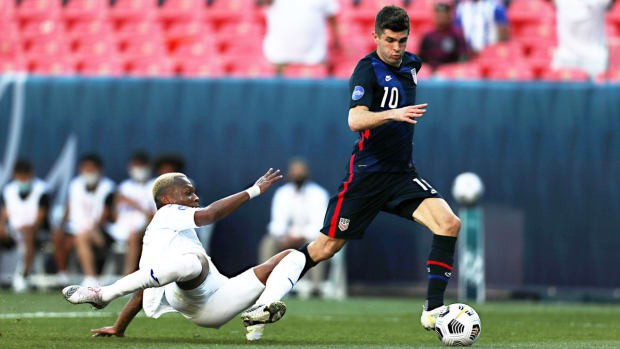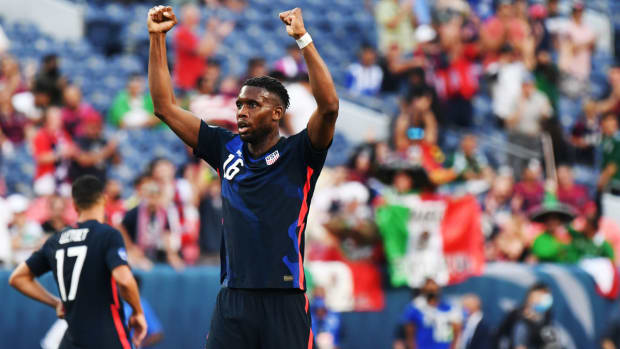No amount of friendlies can replicate competitive, knockout matches—especially with Concacaf's trademark touches. The U.S. found that out vs. Honduras.
Over nearly 89 eventful minutes on Thursday evening, a young U.S. men's national team from which much is expected had trouble mastering the fine margins that often define rivalries and determine elimination matches. Facing an experienced and fearless Honduran side in the inaugural Concacaf Nations League semifinal, the favored U.S. was in the game but never really in control of it. And after missing several promising scoring chances and nearly falling behind, a penalty shootout loomed.
Then the welcome breakthrough came. Substitute striker Jordan Siebatcheu, playing in just his fourth senior international, scored a maiden U.S. goal that’s arguably the most significant of coach Gregg Berhalter’s two-and-a-half-year tenure. A loss in Denver would’ve been hard to stomach considering the talent, potential and time together this U.S. side has enjoyed. It would’ve blunted quite a bit of positive momentum. Instead, the Americans won, 1–0—surviving and advancing in the truest sense of the cliché to Sunday’s final. There, they’ll play Mexico, a penalty-kick survivor vs. Costa Rica in Thursday's second match. This weekend’s winner will lift the new Nations League trophy and build welcome confidence ahead of World Cup qualifying this fall.
"We’d like to have scored more goals and won more comfortably, but that's not reality. You’ll see all sorts of difficult results and difficult games [in Concacaf], and that's part of it," Berhalter said afterward. "These guys need that experience, so I’m really pleased with how the game went, really pleased that we had to go through this, because it's a great learning experience."
Siebatcheu’s goal began with U.S. center back John Brooks, who had an active evening and set up the game-winning play with a lofted pass toward the right side of the penalty area. There, Weston McKennie nodded the ball back into the middle, where it skipped just past Brenden Aaronson before Siebatcheu dived and placed a header well beyond the reach of Honduras goalkeeper Luis López.
"That's why we put Jordan on, because we know he's a force on crosses. We know he battles in the penalty box, good physicality, and he gave us the edge that we needed," Berhalter said.
It was a narrative-altering, trajectory-changing goal. This semifinal appeared destined for penalties. A home setback in the USA’s first competitive match since the fall of 2019 would’ve rekindled some of the doubts that surfaced back then. Instead, there’s a final to prepare for and, hopefully, a bit of clutch, big-game pedigree and experience now laid over the foundation Berhalter has been building.
“It was the first tough, really official competitive game we’ve had,” forward Gio Reyna told CBS following the game. “Just to show the resilience and the character of this group, to get a goal at the end was nice to see.”
It’s still unclear how significant, major or meaningful a Nations League title would be. But Thursday’s game clearly was no friendly—that was clear seconds after kickoff, when Brooks and Honduras star forward Alberth Elis shared some contact and then a stare-down after Elis fell in the American half. The U.S. has feasted on Concacaf opponents in recent exhibitions, winning four games from November through March by a combined 23–3. Honduras presented a different level of competition, however, and had the experience, athleticism and opportunism to create nervy moments for the hosts.
Berhalter made three changes from the lineup that started well in Sunday’s friendly loss at Switzerland. The obvious ones were the insertion of the USA’s two UEFA Champions League finalists, forward Christian Pulisic and goalkeeper Zack Steffen. The tactical move was the shift of defender Sergiño Dest from left back to right, and the deployment of Fulham’s Antonee Robinson on the left. What resulted was an American XI that was the second-youngest ever to take the field in a competitive international, and one that created and yielded numerous chances.

Concerns about Pulisic’s durability seem to have faded a bit this spring. The 22-year-old, who suffered repeated muscular setbacks last year, has been available consistently for Chelsea since the end of February and said this week that there was no concern about his fitness following the Champions League final and the long flight to Denver.
“Going from one competition to the next is what I’ve been doing all season,” he said. “It’s constantly having to refocus and get ready for the next game and quick turnarounds. It’s something that I’m used to. … I was playing at the highest level and I’m feeling ready and excited for these games coming up as well.”
Pulisic started on the left but floated relatively freely, often coming inside to find the ball or create new passing patterns, or interchanging with Robinson or midfielder Sebastian Lletget in an (usually unsuccessful) attempt to knock Honduras off-balance. Pulisic had a glittering opportunity to score in the 30th minute when Reyna slipped him through on the left. Pulisic failed to get around the Honduran goalie, however, and the chance went for naught.
That was one of several close calls during a wide-open, often-frantic first half. The USA held more of the ball, as expected. But Los Catrachos were a threat on the counter, also as expected, and they pressed and chased well enough to deny the Americans much rhythm in possession. The visitors were especially disciplined in back, and the U.S. midfield trio of Lletget, McKennie and Jackson Yueill (starting in place of the recovering Tyler Adams), was relatively quiet. Berhalter’s forwards and outside backs had been the primary engineers of the attack before the game-winner.

"Honduras was very compact, and they wanted us to play central and I think we did too often," Berhalter explained. "We played central and got turnovers and started transitions. I think at times we lacked balance in the midfield. We could’ve been more stable and drawn them out a little bit more."
The USA should’ve forged ahead in just the sixth minute, but Reyna capped a brilliant dribbling run through the Honduran penalty area with an inaccurate shot instead of an easy pass to a wide-open Josh Sargent. About 20 minutes later, Sargent was worth a goal on the defensive end when he cleared a net-bound header by Elis. Steffen had come off his line and was saved by the Werder Bremen striker, who used the back of his head to keep the ball from going in. Sargent then forced a save with a well-struck header, and Elis nearly connected with a teammate on a dangerous cross. The chances continued after the break. In the 51st minute, Steffen made amends for his first-half miscue when he raced out to deny Anthony Lozano on a breakaway.
“We’re expecting good Concacaf competition,” Pulisic said Wednesday. He and his teammates had it.
The game got choppier as Honduras introduced several substitutes and fatigue and gamesmanship started to play a role. The stretcher bearers made numerous appearances as Hondurans milked the clock. In the 78th minute, Berhalter brought on Aaronson, Siebatcheu and Reggie Cannon and removed Reyna, Sargent and Robinson. It appeared to be about fresh legs rather than fresh tactics, and in the dying seconds, those fresh legs paid off. The resolute Honduran rearguard was finally beaten, and the U.S. had found a way to grind through a challenging game.
"We advanced to a final, so I think we’re happy. This game is exactly what we needed. When you think about the level of competition, the competitiveness of the game, some of these guys have never seen that before," Berhalter said. "For the guys to have to compete and dig like that at altitude and heat, they did a fantastic job."
More Soccer Coverage: